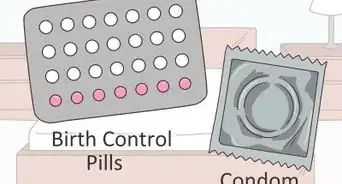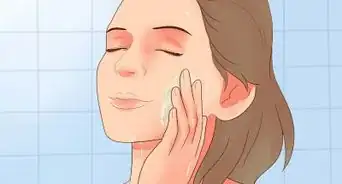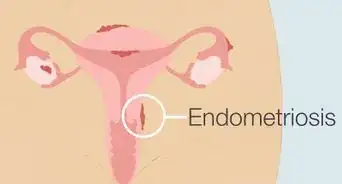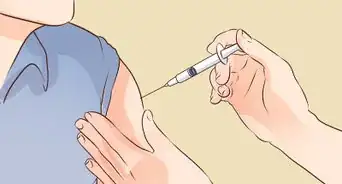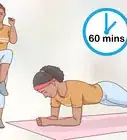This article was co-authored by Laila Ajani. Laila Ajani is a Fitness Trainer and founder of Push Personal Fitness, a personal training organization based in the San Francisco Bay Area. Laila has expertise in competitive athletics (gymnastics, powerlifting, and tennis), personal training, distance running, and Olympic lifting. Laila is certified by the National Strength & Conditioning Association (NSCA), USA Powerlifting (USAPL), and she is a Corrective Exercise Specialist (CES).
There are 8 references cited in this article, which can be found at the bottom of the page.
wikiHow marks an article as reader-approved once it receives enough positive feedback. In this case, 88% of readers who voted found the article helpful, earning it our reader-approved status.
This article has been viewed 75,106 times.
The tween years are the period of time between being an adolescent and being a teenager, from age eight to age 12. During the “tween” period, you may start to experience puberty, which can result in changes in your hygiene, your lifestyle, your confidence and your self-esteem.[1] Taking good care of your body as you go through the tween years as a young girl will ensure you are prepared for puberty and can adapt well to the changes occurring in your body.
Steps
Maintaining Good Hygiene
-
1Be aware of how and why you get your period. Menstruation usually occurs in girls between ages nine and 13.[2] When you first start to menstruate or get your period, your flow may be irregular as your body adapts to the rapid physiological changes. You may notice a clear or white fluid secreting from the glands within your vagina several months before you get your first period. Don’t worry, this is a normal occurrence and is an indication you are going to get your period soon.[3]
- Your menstrual cycle has three phases. The follicular phase is the beginning of your period and ends when you start to ovulate. This phase usually lasts 11 – 21 days. The luteal phase is the start of ovulation and continues until the beginning of your next period. The menses phase is the final phase of menstruation where you bleed during your period and typically lasts around three to seven days.[4]
- In addition to bleeding, you may also experience cramping before or during your periods. Other side effects of menstruation include bloating, mood swings, and headaches. If your cramps become severe or your other period symptoms become severe, you should see a doctor to get medication to alleviate the side effects. You can also ease menstrual pain using home remedies.
- Once you get your period, you can still do activities like swimming, horseback riding, yoga, and physical education classes. You can participate in normal activities and should try to be physically active during your period, as it can help to ease your cramps.
-
2Prepare for your period by buying feminine hygiene products. Feminine hygiene products such as tampons and pads are an important way to collect the bleeding that occurs during your period. You should decide if you are more comfortable using tampons or pads. You may start with pads and then as you get more comfortable, you may switch to tampons. You can find feminine hygiene products at your local drug store.
- To use pads, place the pad in your underwear with the sticky side down and press it in place. It will then soak up the bleeding. Make sure your replace your pad as needed so the bleeding down not soak into your underwear or give off a strong smell.
- To use tampons, you will need to put it inside your vagina to soak up the blood. There are instructions on the label of the tampons that show you how to insert them properly. Some tampons comes with a plastic or cardboard covering, known as the “applicator”, that will make it easier for you to insert the tampon. Do not leave the applicator in your vagina once the tampon is in place.
- All tampons come with a string at one end to help you take it out when it’s time to change it, which should be done every four to eight hours. Tampons are designed to stay in your vagina and will not get lost or slip out. Only use a tampon with the lowest absorbency level based on the heaviness or lightness of your period. Never use a “super” tampon if a “regular” tampon is needed. Using tampons that are too absorbent or neglecting to change your tampon when needed can put you at risk for toxic shock syndrome (TSS), a rare but dangerous infection.
- You may also wish to use a menstrual cup, which is a reusable cup you insert into your vagina for up to 12 hours. You empty and wash the cup before reinserting it.
Advertisement -
3Stick to a skincare routine to prevent acne. As you continue to develop, you may notice your skin will become more oily and you may sweat more. This is because your sweat glands are growing and your hormones are starting to kick in. Acne is common in teens, especially with the hormonal changes that occur with puberty and can appear as bumps such as blackheads, whiteheads, pimples, or cysts. If your parents had acne as teens, you may be more likely to develop it as well. You can help to prevent acne and treat your acne by following a skincare routine.[5]
- Make sure you wash your face at least twice a day, once in the morning and once at night, with a mild cleanser and warm water. Use your fingertips to gently massage in the cleanser and avoid scrubbing, scratching or picking your skin. Avoid astringents as they can dry out and irritate your skin. Use a light, water-based moisturizer that has SPF 15 or higher to protect your skin from the sun and to prevent it from getting dry.
- If you want to wear make up, look for water-based products that are labeled “noncomedogenic” or “non-allergenic.” Use makeup remover to take off your makeup before you go to bed, as going to bed with makeup on can cause acne.
- If you start to develop more severe acne, you should see a dermatologist to get prescription treatments for your acne. The earlier you address your acne, the faster it will go away and you will have a reduced risk of scarring on your face or body due to acne.
-
4Use deodorant to control odor. You may also notice that because you are sweating more, you may have a stronger odor coming from the sweat glands in your armpits. Manage this odor by using deodorant. You can buy these products at your local drugstore.
- Apply the deodorant on your arm pits in the morning as part of your morning routine. If you tend to sweat a lot or are going to do physical activity, you may want to re apply the deodorant throughout the day.
-
5Talk to your parents about getting a bra as your breasts develop. For many tween girls, puberty appears through breast growth and development. You may notice small, tender lumps on your chest and your nipples may get bigger over the next few years. As your breasts develop, one breast may appear larger than the other but they will even out by the time they reach their final size and shape. To help support your growing breasts, you should talk to your parents about getting a bra.
- Getting a bra can be exciting, as it is your first step to becoming a woman and an adult. But if you are shy or embarrassed about having to buy a bra, you may want to go on a shopping trip with a friend who already has a bra instead of your parents.
-
6Take good care of your hair and scalp to prevent oil build up. The same hormones that cause acne can also cause oil build up on your hair and scalp. Wash your hair as needed to help control and prevent oil build up. Apply the shampoo with warm water and massage the product into your hair and scalp. Do not scrub, scratch, or rub your hair or scalp too hard.[6]
- You can also use conditioner after you shampoo your hair to keep your hair healthy and hydrated. Look for hair products that are formulated for your hair texture. If you notice white flakes on your clothing, you may be developing dandruff. You can use antidandruff products to help control dandruff.
- You should also use styling products like styling gels and lotions that are appropriate for your hair texture, whether it is straight or tight 4c curls. Try different products until you find some that work for you.
-
7Consider shaving your body hair once it develops. You may start to notice hair growing on your legs, arms, and armpits, as well as pubic hair on your vagina. Some tween girls will start to shave their leg hair and armpit hair as a personal preference. This is a purely aesthetic choice and does not provide any medical benefits.
- If you decide to start shaving your leg hair, you should use a razor made for body hair and shaving gel or warm soap and water. Ask a parent to show you how to properly shave your legs, as you are using a sharp razor and do not want to hurt yourself. Always shave up your legs, against the direction of your hair.
- If you decide to also shave your armpit hair, make sure you use shaving gel or warm soap and water to create a lather. The hair in your armpit may grow in different directions, so you may need to shave in a few different directions as well.
Maintaining a Healthy Lifestyle
-
1Keep in mind your weight and shape will change. In your tween years, you may notice that your arms, legs, hands, and feet are growing faster than the rest of your body. You may feel more clumsy or awkward, but over time, you will get past these growth spurts and you will feel more comfortable in your body. [7]
- You may also notice that your body shape and weight is shifting. You may develop more fat in your stomach, buttocks, and legs. This is completely normal and part of growing up. No one’s tween development will be the same and you may notice your body is developing differently than other girls your age.
-
2Be physically active at least one hour a day.[8] During your tween years, it’s very important that you maintain a healthy lifestyle by being physically active at least one hour a day. Exercise can help you maintain a healthy weight, prevent serious illnesses, give you more energy, and give you more confidence.
- If you already enjoy a particular activity or sport, consider joining a team or a league. Sign up for your school team or look for a recreational team in your area. Talk to your parents about pursuing a sport more seriously, especially if you enjoy it and are good at it.
- If you are not very physically active, you can start slow by making fitness goals. This could be joining a yoga class or a fitness class with a friend and doing it for a set number of weeks. Or this could be taking up a gym routine and going one day a week for several months. Focus on realistic goals and enlist the support and help of friends and family to stay motivated.
-
3Get eight to 10 hours of sleep a night.[9] Sleep is a key element to maintaining a healthy lifestyle as a tween, especially as your body continues to develop. Getting eight to 10 hours of sleep a night can allow you to do all the things you enjoy and maintain your commitments, like school, family, friends, physical activity, and hobbies or passions.[10]
- Set a sleep schedule by waking up at the same time every morning and going to bed at the same time every night. You should avoid hitting the snooze button or use an alarm without one, as snoozing in the morning can throw off your internal clock.
- Do a relaxing routine before bed like taking a bath, reading a book, or talking to a friend or parent. Avoid bringing screens into your bedroom or into your bed, such as your cellphone, your computer, or your TV.
- Make sure your bedroom is cool, dark, quiet, and comfortable. Dim the lights, curl up in your favorite comforter or blanket and listen to soothing music to help you go to sleep.
-
4Eat a healthy, balanced diet.[11] Healthy eating is essential to having enough energy to get through the day and to maintain a healthy weight. Try to avoid eating junk food and fast food every day or even every week, as it is an empty source of energy and it will not keep you full and healthy.
- Start every morning with a breakfast high in fiber, such as a bowl of whole grain cereal. You can also add a few tablespoons of unprocessed wheat bran to your cereal or add flaxseed to your breakfast cereal, your yogurt, or your morning smoothie.
- If you struggle to eat healthy while you’re at school, try to go for the fruit or vegetable option in the cafeteria and load up on healthy grains like rice, quinoa, or couscous. You should limit your portions so you have one cup of fruits and vegetables, one cup of grains and a small serving of protein like meat, beans, or tofu on your lunch plate.
- You can also make your own lunches to bring to school with a healthy serving of fruits and vegetables, protein, and grains. You should also pack snacks in your bag like nuts, dried fruit, or fresh fruit, so you can avoid getting hungry throughout the day. Snacks are also useful if you are doing sports or other activities after school and need some extra energy.
- You should work with your parents to develop healthy dinner meals at home and make a meal schedule. This way, you will know what’s on the menu for the week and can assist your parents in cooking and preparing the meals.
-
5Avoid skipping meals or not eating. While it may be tempting to skip a meal or not eat a meal in an effort to lose weight, depriving yourself of food will only throw off your food schedule and confuse your body. Instead, focus on eating three healthy meals a day and balancing your meals with exercise. This will help you to maintain a healthy weight and have enough energy as your body continues to develop into adulthood.
- In your tween years, you may be more susceptible to emotional eating, where you eat because you are bored, stressed, or feeling down. Avoid the need to do some emotional eating by writing in a journal, going for a walk or a run, hanging out with a friend, or volunteering in your community. Building good eating habits will help you to maintain a positive body image and feel healthy in your developing body.
Maintaining Your Confidence and Self-Esteem
-
1Practice self care. As you enter your tween years and eventually your teen years, you may struggle to maintain your self-confidence and your self-esteem. This could be due to your developing and changing body as well as the emotional effects of puberty. Building good self-esteem will give you the courage to try new things and the power to make good choices. When you start to feel sad, alone, anxious, or stressed, you may want to focus back on your needs and practice self care. This can help you to remember your inner strength and make yourself feel confident again by focusing on yourself.[12]
- You can practice self care by taking the time to pamper yourself with a bath, a facial or a pedicure and a manicure. You can also focus on alone time or “you time”, where you do an activity that will calm you, such as reading, writing, listening to music, or taking a 10 minute power nap.
-
2Focus on a skill or activity you are good at and you enjoy. Another way you can build your self-confidence is to push yourself to pursue a skill or activity you are good at and enjoy. This could be a sport, a hobby, or a field of study that you are passionate about or interested in. Or this could be an activity that you seem to have a natural aptitude for and excel at with ease. Doing well in a skill or activity can help you to feel empowered and boost your self-esteem.[13]
- Make a list of the skills or activities that you enjoy doing, such as basketball, swimming, painting, singing, or writing. Try to set goals around these skills or activities and motivate yourself to pursue them. You may decide to enroll in a painting class after school, for example, or you may try out for the basketball team at school. These actions can help you to improve your skills and feel a sense of achievement while doing an activity you enjoy.
-
3Pursue new experiences. Embrace a positive attitude by being willing to try new experiences. Try a new hobby and discover a hidden talent or join a club and make new friends. Expanding your horizons will allow you to also discover different parts of yourself and have new experiences. This can help to motivate you when you are feeling anxious, bored, or lonely and boost your confidence. [14]
-
4Surround yourself with positive friends and role models. The company you keep can also contribute to your self-confidence and self-esteem. If you have friends who are constantly putting you down or putting themselves down, they may be bringing negativity into your life and eroding your self-confidence. Look for friends that make you feel unique, interesting, and valuable. Having positive people in your life will only enhance your self-esteem and give you the confidence to be yourself.[15]
- You should also look for positive role models in the form of teachers, family members, peers, or even your sports coach. Receiving guidance, support, and mentorship from a role model can help to boost your self-confidence and grow as an individual.
References
- ↑ http://www.medicinenet.com/tween_child_development/page2.htm
- ↑ https://my.clevelandclinic.org/childrens-hospital/health-info/ages-stages/adolescence/hic-How-to-Talk-to-Your-Adolescent-Girl-About-her-Body
- ↑ https://my.clevelandclinic.org/childrens-hospital/health-info/ages-stages/adolescence/hic-How-to-Talk-to-Your-Adolescent-Girl-About-her-Body
- ↑ http://ovulationcalculation.net/ovulation-cycle.php
- ↑ http://kidshealth.org/teen/your_body/skin_stuff/acne.html?tracking=T_RelatedArticle#cat20116
- ↑ http://kidshealth.org/teen/your_body/take_care/hygiene_basics.html#
- ↑ https://my.clevelandclinic.org/childrens-hospital/health-info/ages-stages/adolescence/hic-How-to-Talk-to-Your-Adolescent-Girl-About-her-Body
- ↑ Laila Ajani. Fitness Trainer. Expert Interview. 31 October 2019.
- ↑ https://sleepfoundation.org/how-sleep-works/how-much-sleep-do-we-really-need
- ↑ https://sleepfoundation.org/how-sleep-works/how-much-sleep-do-we-really-need
- ↑ Laila Ajani. Fitness Trainer. Expert Interview. 31 October 2019.
- ↑ http://youngwomenshealth.org/2012/05/30/self-esteem/
- ↑ http://youngwomenshealth.org/2012/05/30/self-esteem/
- ↑ http://youngwomenshealth.org/2012/05/30/self-esteem/
- ↑ http://youngwomenshealth.org/2012/05/30/self-esteem/

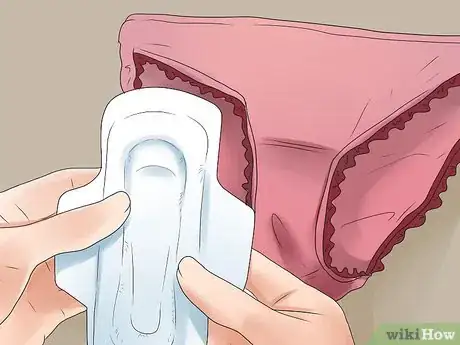
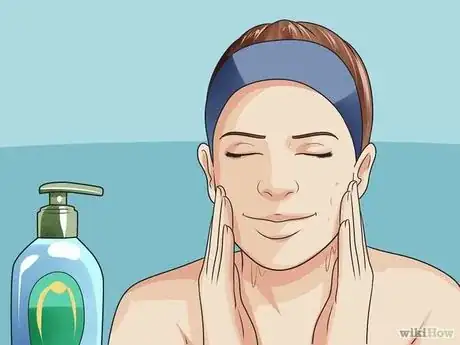
-Step-3-Version-2.webp)
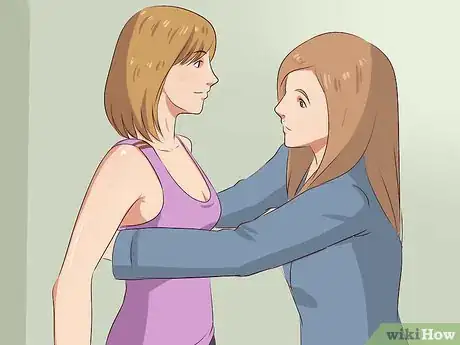
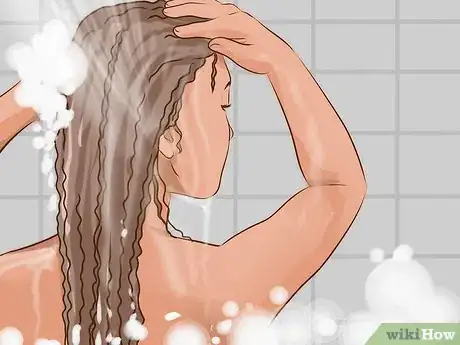
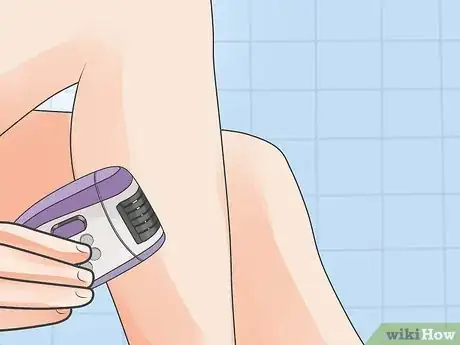
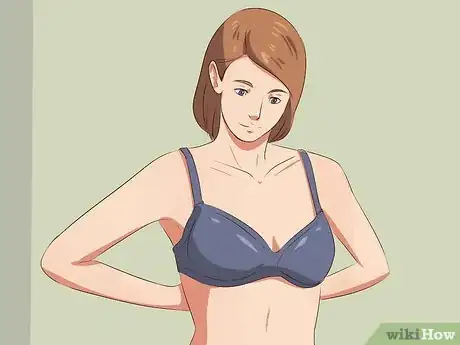


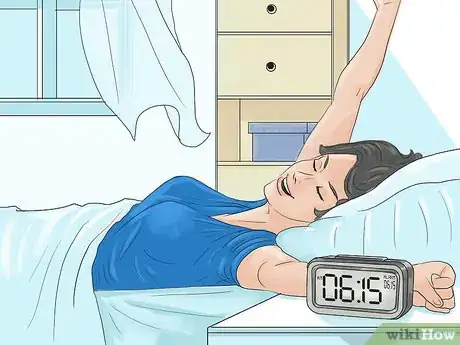
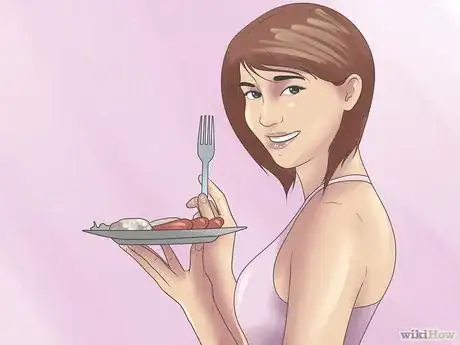
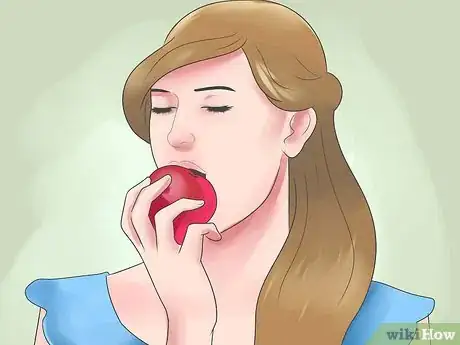
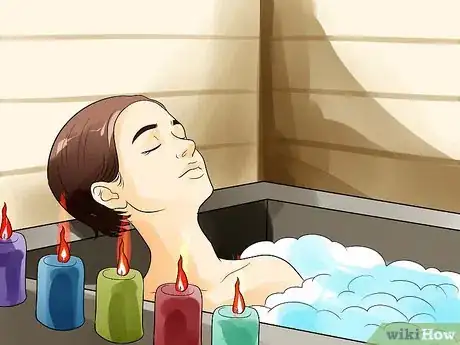



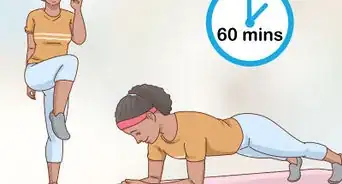



-Step-21.webp)

